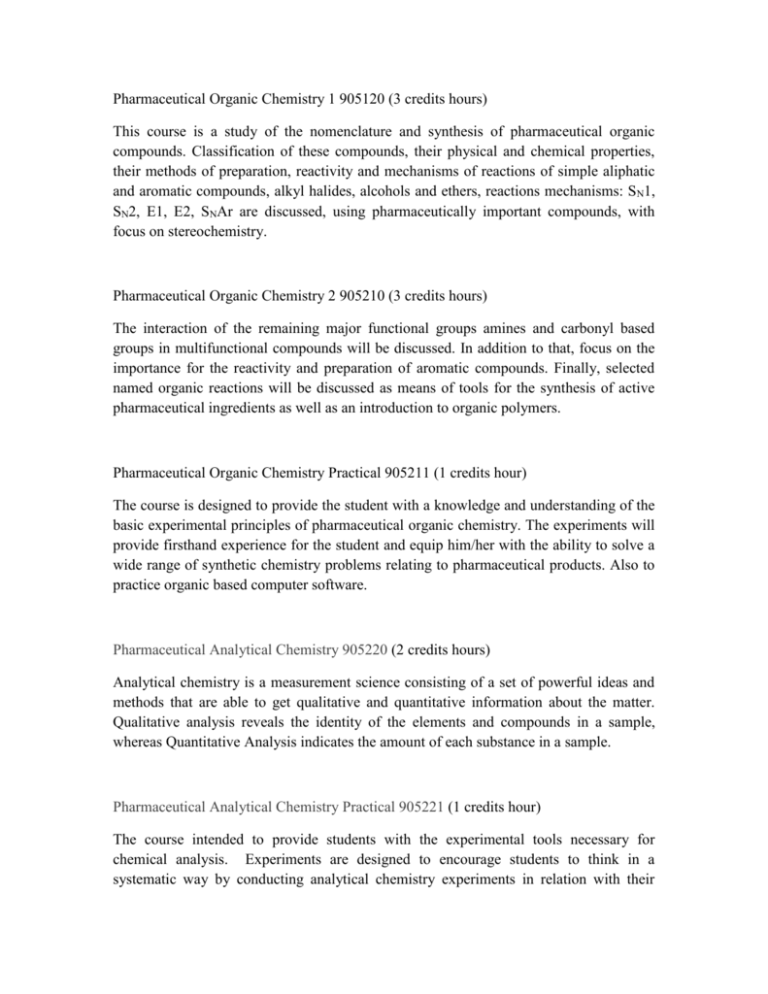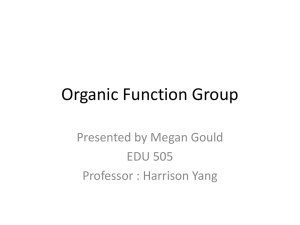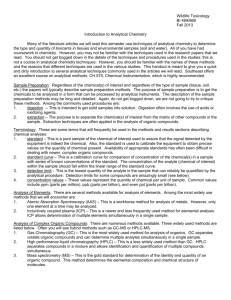Plan Details
advertisement

Pharmaceutical Organic Chemistry 1 905120 (3 credits hours) This course is a study of the nomenclature and synthesis of pharmaceutical organic compounds. Classification of these compounds, their physical and chemical properties, their methods of preparation, reactivity and mechanisms of reactions of simple aliphatic and aromatic compounds, alkyl halides, alcohols and ethers, reactions mechanisms: SN1, SN2, E1, E2, SNAr are discussed, using pharmaceutically important compounds, with focus on stereochemistry. Pharmaceutical Organic Chemistry 2 905210 (3 credits hours) The interaction of the remaining major functional groups amines and carbonyl based groups in multifunctional compounds will be discussed. In addition to that, focus on the importance for the reactivity and preparation of aromatic compounds. Finally, selected named organic reactions will be discussed as means of tools for the synthesis of active pharmaceutical ingredients as well as an introduction to organic polymers. Pharmaceutical Organic Chemistry Practical 905211 (1 credits hour) The course is designed to provide the student with a knowledge and understanding of the basic experimental principles of pharmaceutical organic chemistry. The experiments will provide firsthand experience for the student and equip him/her with the ability to solve a wide range of synthetic chemistry problems relating to pharmaceutical products. Also to practice organic based computer software. Pharmaceutical Analytical Chemistry 905220 (2 credits hours) Analytical chemistry is a measurement science consisting of a set of powerful ideas and methods that are able to get qualitative and quantitative information about the matter. Qualitative analysis reveals the identity of the elements and compounds in a sample, whereas Quantitative Analysis indicates the amount of each substance in a sample. Pharmaceutical Analytical Chemistry Practical 905221 (1 credits hour) The course intended to provide students with the experimental tools necessary for chemical analysis. Experiments are designed to encourage students to think in a systematic way by conducting analytical chemistry experiments in relation with their everyday life, analyzing the results and evaluating the answers via a comparison of the data to other reported literature values. Also, this course will teach students to present their findings in a scientific recognized format by writing a report detailing the experimental procedures, the results, the discussion and their conclusions. Instrumental Analysis and Drug Identification 0905310 (3 credits hours) This course introduces the student to spectral methods of analysis including UV-Visible, atomic absorption, flame emission, Infra-Red (IR), Nuclear Magnetic Resonance (NMR), and flourimetry. Also covers separation techniques (chromatography), in addition to electrochemical principles "potentiometry". Instrumental Analysis and Drug Identification Practical 905311 (1 credits hour) This course will be concerned with the practice of instrumental methods for the separation, identification and quantitative analysis of chemical substances. Satisfactory completion of this course will afford students a working knowledge of analytical instrumentation typically employed in chemical and pharmaceutical research laboratories. It will also provide the student with an appreciation of the relative strengths and limitations of different instrumental based analysis. Medicinal chemistry 1 0905312 (3 credits hours) This course covers different drug classes including antibacterial, antiviral, antineoplastic, steroids and hormones. For each drug class mentioned, drug-target, chemical structure and properties, structure-activity relationships, metabolism, and therapeutic uses are discussed Medicinal chemistry 2 905322 (3 credits hours) The course is a continuation to the previous one. For each drug class mentioned below, drug-target, chemical structure and properties, structure-activity relationships, metabolism, and therapeutic uses, and recognizing the relation between molecules for design of certain synthetic leads for CNS, cardiovascular systems as well as kidneys and histamine based drugs. Medicinal Chemistry Practical 905323 (1 credit hour) This course is designed to introduce pharmacy students to multistep synthesis of active ingredients in pharmaceutical preparations and their assay. Computational chemistry is also included as two dry laboratory sessions to expose the student to the molecular modeling as an insight into in-silico drug design Drug Design 905412 (2 credits hours) The course will cover the basic principles of how new drugs are discovered with emphasis on the molecular aspects of drug action (chemical, physical and biological), important methods and computational techniques within the drug discovery process like QSAR, lead identification and optimization. The course is further enhanced with seminars on recent developments and applications of drug design principles discussed by students. Phytochemistry 905410 (3 credits hours) This course is roughly composed of different classes of phytochemicals. Extraction and chromatographic methods will be also introduced. In addition, basis knowledge on the categorization system of plants, nomenclature, taxonomy and evaluation will be covered. Phytochemistry Practical 905411 (1 credits hour) This laboratory will evolve the basic knowledge obtained by the student in phytochemistry of plants. Focus will be made on methods of identification and extractions of naturally occurring substances with medicinal use from plants. Methods for their quantitation will also be introduced. Phytotherapy 905420 (3 credit hours) All cultures around the world have used plants as medicines either as their sole health care modality, or as a complementary or alternative option. This course explores the history of plant use in various cultures around the world and examines the similarities and differences of their systems of healing. Students learn more about the medicinal effects of many plants through both personal experience and herbal monographs prepared by modern and traditional Herbalists.




